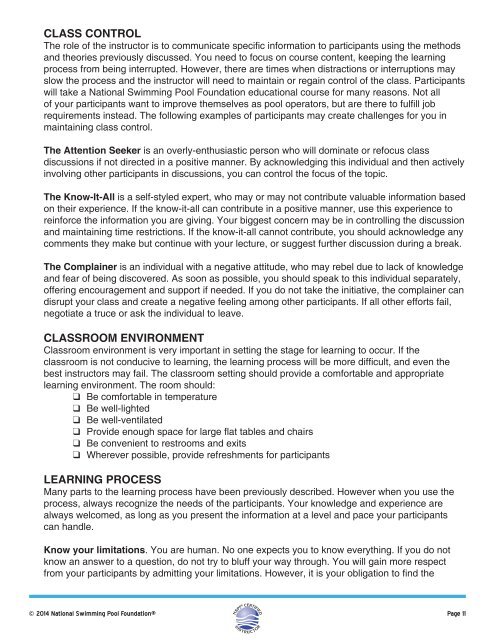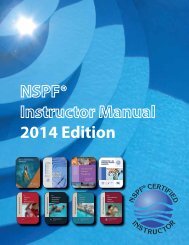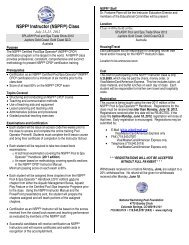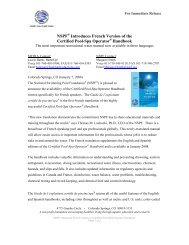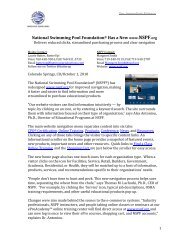English Instructor Manual (PDF) - Metric Version - National ...
English Instructor Manual (PDF) - Metric Version - National ...
English Instructor Manual (PDF) - Metric Version - National ...
Create successful ePaper yourself
Turn your PDF publications into a flip-book with our unique Google optimized e-Paper software.
CLASS CONTROL<br />
The role of the instructor is to communicate specifi c information to participants using the methods<br />
and theories previously discussed. You need to focus on course content, keeping the learning<br />
process from being interrupted. However, there are times when distractions or interruptions may<br />
slow the process and the instructor will need to maintain or regain control of the class. Participants<br />
will take a <strong>National</strong> Swimming Pool Foundation educational course for many reasons. Not all<br />
of your participants want to improve themselves as pool operators, but are there to fulfi ll job<br />
requirements instead. The following examples of participants may create challenges for you in<br />
maintaining class control.<br />
The Attention Seeker is an overly-enthusiastic person who will dominate or refocus class<br />
discussions if not directed in a positive manner. By acknowledging this individual and then actively<br />
involving other participants in discussions, you can control the focus of the topic.<br />
The Know-It-All is a self-styled expert, who may or may not contribute valuable information based<br />
on their experience. If the know-it-all can contribute in a positive manner, use this experience to<br />
reinforce the information you are giving. Your biggest concern may be in controlling the discussion<br />
and maintaining time restrictions. If the know-it-all cannot contribute, you should acknowledge any<br />
comments they make but continue with your lecture, or suggest further discussion during a break.<br />
The Complainer is an individual with a negative attitude, who may rebel due to lack of knowledge<br />
and fear of being discovered. As soon as possible, you should speak to this individual separately,<br />
offering encouragement and support if needed. If you do not take the initiative, the complainer can<br />
disrupt your class and create a negative feeling among other participants. If all other efforts fail,<br />
negotiate a truce or ask the individual to leave.<br />
CLASSROOM ENVIRONMENT<br />
Classroom environment is very important in setting the stage for learning to occur. If the<br />
classroom is not conducive to learning, the learning process will be more diffi cult, and even the<br />
best instructors may fail. The classroom setting should provide a comfortable and appropriate<br />
learning environment. The room should:<br />
Be comfortable in temperature<br />
Be well-lighted<br />
Be well-ventilated<br />
Provide enough space for large fl at tables and chairs<br />
Be convenient to restrooms and exits<br />
Wherever possible, provide refreshments for participants<br />
LEARNING PROCESS<br />
Many parts to the learning process have been previously described. However when you use the<br />
process, always recognize the needs of the participants. Your knowledge and experience are<br />
always welcomed, as long as you present the information at a level and pace your participants<br />
can handle.<br />
Know your limitations. You are human. No one expects you to know everything. If you do not<br />
know an answer to a question, do not try to bluff your way through. You will gain more respect<br />
from your participants by admitting your limitations. However, it is your obligation to fi nd the<br />
© 2014 <strong>National</strong> Swimming Pool Foundation® Page 11


